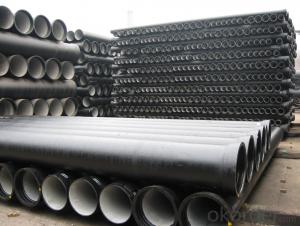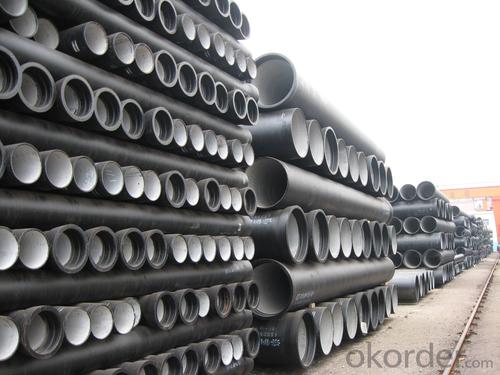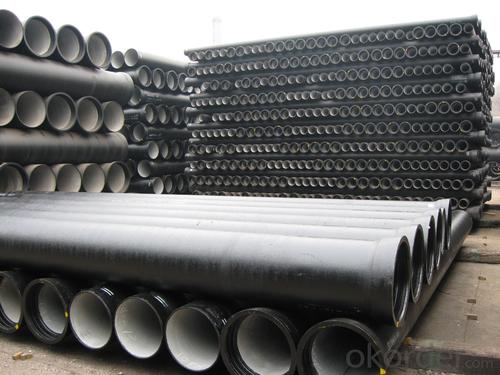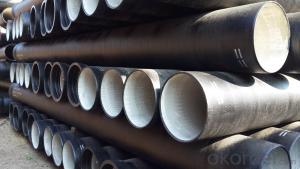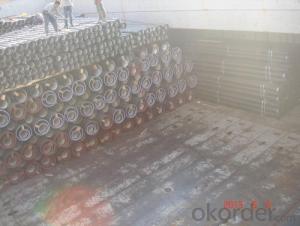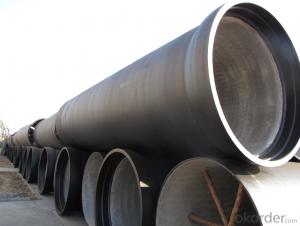Ductile Iron Pipe DN1200
OKorder Service Pledge
Quality Product, Order Online Tracking, Timely Delivery
OKorder Financial Service
Credit Rating, Credit Services, Credit Purchasing
You Might Also Like
Specifications
Quick Details
| Place of Origin: | China (Mainland) | Brand Name: | CMAX | Model Number: | T type / K type / Flange type |
| Length: | 6m / 5.7m / Negotiable | Standard: | ISO2531 / EN545 / EN598 | Application: | Potable / Sewage water |
| Diameter: | DN80~DN2200 | Shape: | Round | Hardness: | 230 |
| Pipe Wall Thickness: | standard | Pull Strength: | 420 | Yield (≥ MPa): | 300 |
| Material: | Ductile Iron | Type: | Centrifugal ductile cast iron pipe | Certification: | ISO2531 / EN545 / EN598 |
| Outer Diameter: | 80-2200 | Thickness: | standard | Specification: | DN80~DN2200 |
| |
The advantages to the customer:
Trustworthy financial strength.
One-stop shopping.
Fast and efficient service.
Coordination of shipments from multiple plants.
Specialists of the overseas shipping process.
A more competitive price.
- Q: Can ductile iron pipes be used for irrigation systems?
- Yes, ductile iron pipes can be used for irrigation systems. Ductile iron pipes are commonly used in various applications, including water supply systems and irrigation systems. They are known for their strength, durability, and corrosion resistance, making them suitable for transporting water in irrigation systems.
- Q: Can ductile iron pipes be used for hydropower projects?
- Yes, ductile iron pipes can be used for hydropower projects. Ductile iron is known for its strength, durability, and resistance to corrosion, which makes it suitable for various applications including hydropower projects. These pipes can effectively handle the high pressure and flow required for hydropower generation, making them a reliable choice for this purpose.
- Q: How are ductile iron pipes repaired in case of damage?
- Ductile iron pipes are commonly used in various applications due to their high durability and strength. However, like any other materials, they can experience damage over time due to external factors or internal corrosion. In such cases, there are several methods available for repairing ductile iron pipes. One common method is known as the trenchless repair technique. This method involves repairing the damaged section of the pipe without the need for extensive excavation. It typically includes the use of specialized equipment to access the damaged area and carry out the necessary repairs. This technique is particularly beneficial as it reduces disruption to the surrounding area and minimizes costs associated with excavation. Another method for repairing ductile iron pipes is the use of epoxy lining. This technique involves applying a layer of epoxy resin to the interior surface of the pipe, effectively sealing any cracks or leaks. Epoxy lining is an effective and cost-efficient solution, as it provides a long-lasting repair and improves the overall condition of the pipe. In cases where the damage is severe or extensive, the damaged section of the ductile iron pipe may need to be replaced. This typically involves cutting out the damaged portion and installing a new section of pipe. The replacement process may require excavation and can be more time-consuming and costly compared to other repair methods. However, it ensures a complete and permanent solution for the damaged pipe. It is worth noting that the specific repair method chosen for ductile iron pipes depends on the extent of the damage, accessibility, and other factors. Professional assessment and inspection are crucial to determine the most suitable repair technique. Consulting with experienced pipeline repair specialists or civil engineers is highly recommended to ensure the most effective and durable repair solution for ductile iron pipes.
- Q: What are the different types of joints used with ductile iron pipe?
- There are several different types of joints that can be used with ductile iron pipe. These joints are designed to provide a secure and watertight connection between sections of pipe. Some of the most common types of joints used with ductile iron pipe include: 1. Mechanical Joint: This is the most commonly used joint for ductile iron pipe. It consists of a gland and a follower which are tightened using bolts and nuts to provide a tight seal. Mechanical joints are flexible and can accommodate slight misalignments. 2. Push-On Joint: This type of joint does not require any bolts or nuts. It is designed to be easily assembled by simply pushing the pipe sections together. A rubber gasket is used to provide a watertight seal. 3. Restrained Joint: Restrained joints are specifically designed for applications where pipe movement needs to be limited. These joints typically include a mechanical joint with additional features such as thrust collars or tie rods to prevent axial movement. 4. Flanged Joint: Flanged joints are commonly used for larger diameter pipes. The pipe ends are flanged and then bolted together, with a gasket placed in between to create a leak-proof connection. Flanged joints are typically used in applications where frequent disassembly and reassembly may be required. 5. Welded Joint: In some cases, ductile iron pipe sections may be welded together using a fusion welding process. This creates a permanent and strong joint. Welded joints are commonly used in high-pressure applications where a reliable and durable connection is required. It is important to note that the choice of joint type will depend on the specific requirements of the project, such as the pipe diameter, pressure rating, and the nature of the fluid being transported. Additionally, local regulations and standards may also dictate the type of joint that should be used in certain applications.
- Q: Can ductile iron pipes be used for underground storage tanks?
- No, ductile iron pipes are not suitable for underground storage tanks. Underground storage tanks usually require special materials that have corrosion resistance and can withstand the pressure and environmental conditions.
- Q: Can ductile iron pipe be used for chemical processing plant applications?
- Yes, ductile iron pipe can be used for chemical processing plant applications. It is durable, corrosion-resistant, and has high tensile strength, making it suitable for transporting various chemicals and fluids in such environments. Additionally, its flexibility and ease of installation make it a practical choice for piping systems in chemical processing plants.
- Q: Are ductile iron pipes resistant to chloride-induced corrosion?
- Indeed, chloride-induced corrosion can be effectively resisted by ductile iron pipes. Ductile iron, a variant of cast iron fortified with magnesium for enhanced malleability and crack resistance, possesses a ferritic microstructure that grants exceptional resilience against chloride-induced corrosion. The interaction between chloride ions in water or soil and the metal surface can lead to the development of corrosion byproducts like rust. Nonetheless, the inclusion of magnesium in ductile iron forms a protective coating, preventing the infiltration of chloride ions and thus impeding corrosion. Consequently, ductile iron pipes are well-suited for a broad spectrum of applications, including water supply and sewerage systems, wherein exposure to chlorides is prevalent.
- Q: If the ductile iron pipe is broken, can we use rush repair?
- PE pipe repair section, as the name suggests, is a kind of used to repair the pipeline accessories. At present, the specifications of the repair section are: Phi 90, Phi 110, Phi 125, Phi 160, Phi 200, Phi 225, Phi 250, Phi 315 these specifications.
- Q: Can ductile iron pipes be used for both water and sewer applications?
- Yes, ductile iron pipes can be used for both water and sewer applications. Ductile iron pipes are highly durable and have excellent resistance to corrosion, making them suitable for carrying both potable water and wastewater. They can withstand high pressure and are resistant to external loads, making them ideal for underground installations. Additionally, ductile iron pipes have a long service life and require minimal maintenance, making them a cost-effective choice for both water and sewer systems.
- Q: Can ductile iron pipes be used for gravity flow applications?
- Ductile iron pipes are suitable and widely used for gravity flow applications. Renowned for their strength, durability, and flexibility, these pipes are perfect for a variety of uses, such as gravity flow systems. They are commonly employed in water and wastewater systems, storm drainage systems, and other applications that necessitate resistance to high internal and external pressures. The pipes possess the capability to bear the weight of the flowing fluid without any supplemental support, which makes them a dependable choice for gravity flow applications. Furthermore, their ability to resist corrosion ensures long-term performance in both underground and exposed environments. In conclusion, ductile iron pipes are an excellent option for gravity flow applications.
Send your message to us
Ductile Iron Pipe DN1200
OKorder Service Pledge
Quality Product, Order Online Tracking, Timely Delivery
OKorder Financial Service
Credit Rating, Credit Services, Credit Purchasing
Similar products
Hot products
Hot Searches
Related keywords



